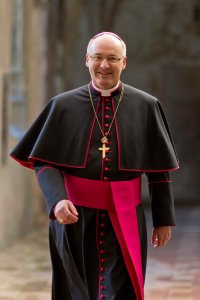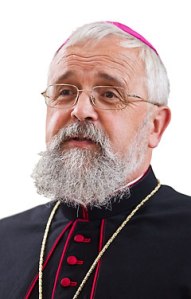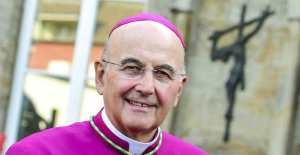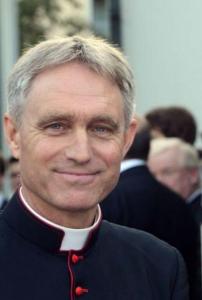In two days’ time, on Thursday 3 May, the much anticipated meeting between representatives of the German episcopate and the heads of several Holy See dicasteries will take place, to discuss the question of Communion for non-Catholics. In February, the majority of German bishops voted in favour of devising a pastoral approach in which non-Catholic spouses of Catholic faithful could receive Holy Communion alongside their partner in certain specific cases. Seven German bishops then wrote to the Holy See to find out if this is a decision that could be taken by a bishops’ conference on its own, or if it involved doctrine and Church unity to such an extent that it is something best left to Rome.
Originally, the invitation for the meeting was extended to Cardinals Reinhard Marx and Rainer Maria Woelki, as well as Bishop Felix Genn, with Woelki as the sole representative of the bishops who signed the letter to Rome. Marx was included as president of the bishops’ conference, while Bishop Genn remains uncertain as to why he was invited. He doesn’t believe it is because of his membership of the Congregation for Bishops, though. Joining these three are Bishops Karl-Heinz Wiesemann and Rudolf Voderholzer, president and vice-president of the doctrinal commission of the German Bishops’ Conference; Bishop Gerhard Feige, president of the ecumenism commission; and Fr. Hans Langendörfer, secretary general of the bishops’ conference. The Roman side of the discussion will consist of Archbishop Luis Ladaria Ferrer, prefect of the Congregation for the Doctrine of the Faith; Cardinal Kurt Koch, president of the Pontifical Council for Promoting Christian Unity; Msgr. Markus Graulich, undersecretary of the Pontifical Council for Legislative Texts; and Fr. Hermann Geissler, office head of the doctrinal section of the Congregation for the Doctrine of the Faith. A team with a heavy focus on doctrinal and legislative expertise, then.
The inclusion of Bishop Voderholzer means that Cardinal Woelki is not the only prelate in the delegation who expressed reservations about the issue. In a recent interview, the bishop of Regensburg explained his reasoning for signing the letter to Rome:
 “Let me say two things in advance: I consider ecumenism as a fundamental mission from Christ Himself. In the Gospel of John, Christ prays to the Father, “that they may be one, as we are one… that they may be brought to perfection as one, that the world may know that you sent me” (John 17: 22b, 23). We must remain true to this fundamental mission of Christ. It’s not a matter of ecumenism yes or no, but of the path of ecumenism, the path to unity. We all yearn for this unity – as do I!
“Let me say two things in advance: I consider ecumenism as a fundamental mission from Christ Himself. In the Gospel of John, Christ prays to the Father, “that they may be one, as we are one… that they may be brought to perfection as one, that the world may know that you sent me” (John 17: 22b, 23). We must remain true to this fundamental mission of Christ. It’s not a matter of ecumenism yes or no, but of the path of ecumenism, the path to unity. We all yearn for this unity – as do I!
Allow me to add another thing: I am aware of the needs and problems which occur in the education of children in confessional marriages, but also in the religious lives of the spouses. I am also aware of the tensions which come from this and which can be hurtful. I know this from conversations with people in these situations and also from my family. I take that with me as bishop.
The point of the letter which I have written with my brother bishops is to find a way which takes the needs of people seriously and which at the same time provides assistance. We are, however, of the opinion that the pastoral “outreach” sought for by the majority of the bishops’ conference, which allows evangelical spouses to receive Communion, does not resolve these problems and needs. It also does not do justice to the meaning of the sacrament of the Eucharist in the Catholic Church. Furthermore, the “outreach” does not sufficiently take into account the different understandings of the various confessions regarding the Eucharist on the one hand, and the Last Supper on the other.
In the question of ecumenism we must, lastly, also take the views of the eastern churches into account. They regard the bond between Church community and Eucharistic community even deeper than in the western churches. When the Catholic Church hides this view, she significantly deepens the split with the orthodox churches.”
 Opposing the actions of the seven bishops is Bishop Gerhard Feige, bishop of Magdeburg and president of the ecumenism commission of the German Bishops’ Conference. In a contribution to Der Zeit last Thursday, Msgr. Feige stated that not taking the chance to help people deepen the joy of the faith and their participation in the Eucharist, as well as promoting ecumenical encounters and strengthening the marriage bond would be “macabre and shameful”. Contrary to other bishops, Msgr. Feige insists that the pastoral outreach exists within modern theological and legal possibilities, referring to the canon law paragraphs which allow local bishops to decide under which circumstances non-Catholic can receive Communion. These circumstances, however, are emergency situations in which the danger of death and the unavailability of ministers of a person’s own denomination play key roles.
Opposing the actions of the seven bishops is Bishop Gerhard Feige, bishop of Magdeburg and president of the ecumenism commission of the German Bishops’ Conference. In a contribution to Der Zeit last Thursday, Msgr. Feige stated that not taking the chance to help people deepen the joy of the faith and their participation in the Eucharist, as well as promoting ecumenical encounters and strengthening the marriage bond would be “macabre and shameful”. Contrary to other bishops, Msgr. Feige insists that the pastoral outreach exists within modern theological and legal possibilities, referring to the canon law paragraphs which allow local bishops to decide under which circumstances non-Catholic can receive Communion. These circumstances, however, are emergency situations in which the danger of death and the unavailability of ministers of a person’s own denomination play key roles.
Bishop Feige, who, as mentioned above, will also travel to Rome on Thursday, also expressed strong criticism against the seven bishops who wrote to Rome. He describes his impression
“that the labourious search for a responsible pastoral solution for individuals did not determine their interest, but rather the fundamental fear of not being truly Catholic anymore. Some still seem to be attached to a pre-Conciliar image of the Church and have little internalised the Catholic principles of ecumenism.”
With these words, Bishop Feige seems to be the one who is rather set in his ways, and it hard to see how such an attitude towards his brother bishops will be helpful in Thursday meeting.
 Münster’s Bishop Felix Genn is hopeful of finding a consensus. While the way in which the seven bishops expressed their difficulties with the conference’s vote did not make him happy, he understands their questions of conscience. In an interview for WDR radio Bishop Genn expressed his happiness about the way in which the standing council of the bishops’ conference discussed the issue last week. And although he would have preferred that the seven bishops had first informed the others about their letter before sending it, Bishop Genn’s attitude is perhaps the most consensus-minded in the delegation, which may be a reason for his inclusion. The bishop, for his part, simply thought of his mother’s motto when hearing about being included in the delegation: “One has never got enough work to do.”
Münster’s Bishop Felix Genn is hopeful of finding a consensus. While the way in which the seven bishops expressed their difficulties with the conference’s vote did not make him happy, he understands their questions of conscience. In an interview for WDR radio Bishop Genn expressed his happiness about the way in which the standing council of the bishops’ conference discussed the issue last week. And although he would have preferred that the seven bishops had first informed the others about their letter before sending it, Bishop Genn’s attitude is perhaps the most consensus-minded in the delegation, which may be a reason for his inclusion. The bishop, for his part, simply thought of his mother’s motto when hearing about being included in the delegation: “One has never got enough work to do.”
Regardless of its outcome, Thursday’s meeting will not only be significant for the German bishops, but for the entire Church, and the entire ecumenical project. For the Congregation of the Doctrine of the Faith this will be the first major test under the new leadership of Archbishop Ladaria Ferrer. Likewise, the Pontifical Council for Legislative Texts, although represented by its undersecretary, has recently come under new leadership as Archbishop Filippo Iannone succeeded Cardinal Coccopalmerio as president in early April. The question of the role of doctrine and law in a papacy devoted in the first place to pastoral care and mercy will receive a resounding answer.
 Bishop-elect Horst Eberlein was born in 1950 in Walsleben (Altmark) and ordained to the priesthood in 1977. He was a priest in parishes in what was then the Apostolic Administration of Schwerin, which in 1994 became a part of the newly erected Archdiocese of Hamburg. He is then the first bishop to be appointed from among the clergy of Hamburg itself. His predecessors as auxiliary bishops came from Schwerin (Norbert Werbs) and Osnabrück (Hans-Jochen Jaschke), and the archbishops were also called from other circumscriptions. Archbishop Heße, for example, came from Cologne.
Bishop-elect Horst Eberlein was born in 1950 in Walsleben (Altmark) and ordained to the priesthood in 1977. He was a priest in parishes in what was then the Apostolic Administration of Schwerin, which in 1994 became a part of the newly erected Archdiocese of Hamburg. He is then the first bishop to be appointed from among the clergy of Hamburg itself. His predecessors as auxiliary bishops came from Schwerin (Norbert Werbs) and Osnabrück (Hans-Jochen Jaschke), and the archbishops were also called from other circumscriptions. Archbishop Heße, for example, came from Cologne. In all likelihood we’ll see a new archbishop of Berlin appointed this year, and the Archdiocese is certainly doing what they can to speed up the process. On a
In all likelihood we’ll see a new archbishop of Berlin appointed this year, and the Archdiocese is certainly doing what they can to speed up the process. On a  From the numerous suggestions, which also include the names of Lutheran Bishop Margot Käßmann and former Berlin mayor Klaus Wowereit, some trends become visible. In addition the those who simply want Cardinal Woelki back, there are some Berlin clergy who appear frequently among the suggestions. Top of the list is Bishop Matthias Heinrich, auxiliary bishop of Berlin since 2009. Apostolic Administrator Tobias Przytarski (pictured at right) and Episcopal Vicar Stefan Dybowski are also named. Other names from outside Berlin are those of Bishop Gerhard Feige of Magdeburg, Cardinal Reinhard Marx of Munich and Father Klaus Mertes, S.J., the school director who uncovered the sexual abuse scandal at Berlin’s Canisius College.
From the numerous suggestions, which also include the names of Lutheran Bishop Margot Käßmann and former Berlin mayor Klaus Wowereit, some trends become visible. In addition the those who simply want Cardinal Woelki back, there are some Berlin clergy who appear frequently among the suggestions. Top of the list is Bishop Matthias Heinrich, auxiliary bishop of Berlin since 2009. Apostolic Administrator Tobias Przytarski (pictured at right) and Episcopal Vicar Stefan Dybowski are also named. Other names from outside Berlin are those of Bishop Gerhard Feige of Magdeburg, Cardinal Reinhard Marx of Munich and Father Klaus Mertes, S.J., the school director who uncovered the sexual abuse scandal at Berlin’s Canisius College. Another familiar name, mentioned often in connection with that of Cardinal Marx, is that of Archbishop Georg Gänswein (pictured at left). The personal secretary of Pope emeritus Benedict XVI and the Prefect of the Papal Household is suggested as archbishop in Berlin or, if Cardinal Marx goes to the German capital, of Munich.
Another familiar name, mentioned often in connection with that of Cardinal Marx, is that of Archbishop Georg Gänswein (pictured at left). The personal secretary of Pope emeritus Benedict XVI and the Prefect of the Papal Household is suggested as archbishop in Berlin or, if Cardinal Marx goes to the German capital, of Munich. It’s taken two years but at long lost the Diocese of Erfurt has a bishop again. From Mainz comes 57-year-old Bishop Ulrich Neymeyr as the successor of Bishop Joachim Wanke, who retired on the first of October of 2012 for health reasons. Bishop Neymeyr, until today the sole auxiliary bishop of the Diocese of Mainz, becomes the second bishop of Erfurt, which was established in 1994. Before that, since 1973, it had been the Apostolic Administration of Erfurt-Meiningen.
It’s taken two years but at long lost the Diocese of Erfurt has a bishop again. From Mainz comes 57-year-old Bishop Ulrich Neymeyr as the successor of Bishop Joachim Wanke, who retired on the first of October of 2012 for health reasons. Bishop Neymeyr, until today the sole auxiliary bishop of the Diocese of Mainz, becomes the second bishop of Erfurt, which was established in 1994. Before that, since 1973, it had been the Apostolic Administration of Erfurt-Meiningen.
 The Diocese of Erfurt encompasses the major part of the German state of Thuringia and was initially created in 1973 from parts of the dioceses of Würzburg and Fulda, which now border it to the west and southwest. At the time it wasn’t a full diocese because of the unique circumstances of being within the Communist state of East Germany. As the Apostolic Administration of Erfurt-Meiningen, it was first led by Bishop Hugo Aufderbeck, who died in 1981 and was succeed by Bishop Joachim Wanke. In 1994, following the German reunification, Erfurt-Meiningen was made a full diocese under the name Erfurt and Bishop Wanke was made its first bishop. He stayed on until 2012 when he retired for health reasons. During that time he hosted Pope Benedict XVI when he visited in 2011 (see image at right). There has in fact been an earlier Diocese of Erfurt, established by Saint Boniface in 742, but that was suppressed again in 755, seemingly without ever having had its own bishop. The cathedral of Erfurt is rooted in that time however. The current St. Mary’s dates from 1154, but was built on the site of the first church built around 742. Erfurt is home to some 150,000 Catholics in 63 parishes.
The Diocese of Erfurt encompasses the major part of the German state of Thuringia and was initially created in 1973 from parts of the dioceses of Würzburg and Fulda, which now border it to the west and southwest. At the time it wasn’t a full diocese because of the unique circumstances of being within the Communist state of East Germany. As the Apostolic Administration of Erfurt-Meiningen, it was first led by Bishop Hugo Aufderbeck, who died in 1981 and was succeed by Bishop Joachim Wanke. In 1994, following the German reunification, Erfurt-Meiningen was made a full diocese under the name Erfurt and Bishop Wanke was made its first bishop. He stayed on until 2012 when he retired for health reasons. During that time he hosted Pope Benedict XVI when he visited in 2011 (see image at right). There has in fact been an earlier Diocese of Erfurt, established by Saint Boniface in 742, but that was suppressed again in 755, seemingly without ever having had its own bishop. The cathedral of Erfurt is rooted in that time however. The current St. Mary’s dates from 1154, but was built on the site of the first church built around 742. Erfurt is home to some 150,000 Catholics in 63 parishes.